- Home
- Tad Williams
The Very Best of Tad Williams
The Very Best of Tad Williams Read online
THE VERY BEST OF
TAD WILLIAMS
TACHYON
SAN FRANCISCO
The Very Best of Tad Williams
Copyright © 2014 by Tad Williams
This is a collected work of fiction. All events portrayed in this book are fictitious and any resemblance to real people or events is purely coincidental. All rights reserved including the right to reproduce this book or portions thereof in any form without the express permission of the author and the publisher.
Introduction copyright © 2014 by Tad Williams
Cover art copyright © 2009 by Kerem Beyit
Cover design and interior design by Elizabeth Story
Tachyon Publications
1459 18th Street #139
San Francisco, CA 94107
415.285.5615
[email protected]
www.tachyonpublications.com
smart science fiction and fantasy
Series Editor: Jacob Weisman
Project Editor: Jill Roberts
Book ISBN: 978-1-61696-137-4 / epub ISBN: 978-1-61696-138-1
Kindle ISBN: 978-1-61696-139-8 / ePDF ISBN: 978-1-61696-140-4
Printed in the United States by Worzalla
First Edition: 2014
9 8 7 6 5 4 3 2 1
All copyrights are by Tad Williams unless otherwise indicated.
“The Old Scale Game” © 2013. First appeared in Unfettered: Tales by Masters of Fantasy, edited by Shawn Speakman (Grim Oak Press: Seattle, WA).
“The Storm Door” © 2010. First appeared in The New Dead: A Zombie Anthology, edited by Christopher Golden (Subterranean Press: Burton, MI).
“The Stranger’s Hands” © 2007. First appeared in Wizards: Magical Tales from the Masters of Modern Fantasy, edited by Jack Dann and Gardner Dozois (Berkley Books: New York).
“Child of an Ancient City” © 1988. First appeared in Weird Tales, John Gregory Betancourt, Fall 1988.
“The Boy Detective of Oz: An Otherland Story” © 2013. First appeared in Oz Reimagined: New Tales from the Emerald City and Beyond, edited by John Joseph Adams and Douglas Cohen (47North: Seattle, WA).
“Three Duets for Virgin and Nosehorn” © 1995. First appeared in Peter S. Beagle’s Immortal Unicorn, edited by Peter S. Beagle, Janet Berliner, and Martin H. Greenberg (HarperPrism: New York).
“Not with a Whimper, Either” © 2002. First appeared in DAW 30th Anniversary: Science Fiction, edited by Sheila E. Gilbert and Elizabeth
R. Wollheim (DAW Books: New York).
“Some Thoughts Re: DARK DESTRUCTOR” © 2006. First appeared in Subterranean, Issue #5.
“Z is for...” © 1991. First appeared in Midnight Zoo, May/June 1991.
“Monsieur Vergalant’s Canard” © 1995. First appeared in The Magazine of Fantasy & Science Fiction, September 1995.
“The Stuff that Dreams Are Made Of ” © 1996. First appeared in David Copperfield’s Beyond Imagination, edited by David Copperfield and Janet Berliner (HarperPrism: New York).
“A Fish Between Three Friends” © 2006. First appeared in Rite: Short Work (Subterranean Press: Burton, MI).
“Every Fuzzy Beast of the Earth, Every Pink Fowl of the Air” © 2012. First appeared in Rip-Off!, edited by Gardner Dozois. (Audile Frontiers: Newark, NJ).
“A Stark and Wormy Knight” © 2009. First appeared in The Dragon Book: Magical Tales from the Masters of Modern Fantasy, edited by Jack Dann and Gardner Dozois (Ace Books: New York).
“Omnitron, What Ho!” © 2014. Original to this collection.
“Black Sunshine” © 2012. First appeared in A Stark and Wormy Knight (Subterranean Press: Burton, MI).
“And Ministers of Grace” © 2010. First appeared in Warriors, edited by Gardner Dozios and George R. R. Martin (Tor: New York).
OTHER TITLES BY TAD WILLIAMS
SERIES
MEMORY, SORROW AND THORN
The Dragonbone Chair (1988)
Stone of Farewell (1990)
To Green Angel Tower (1993)
The Burning Man (1998)
OTHERLAND
City of Golden Shadow (1996)
River of Blue Fire (1998)
Mountain of Black Glass (1999)
Sea of Silver Light (2001)
The Happiest Dead Boy in the World (2004)
SHADOWMARCH
Shadowmarch (2004)
Shadowplay (2007)
Shadowrise (2010)
Shadowheart (2010)
THE ORDINARY FARM ADVENTURES (Co-written with Deborah Beale)
The Dragons of Ordinary Farm (2009)
The Secrets of Ordinary Farm (2011)
THE BOBBY DOLLAR BOOKS
The Dirty Streets of Heaven (2012)
Happy Hour in Hell (2013)
Sleeping Late on Judgment Day (September 2014)
STANDALONE NOVELS
Tailchaser’s Song (1985)
Child of an Ancient City (with Nina Kiriki Hoffman, 1992)
Caliban’s Hour (1994)
The War of the Flowers (2003)
COLLECTIONS
Rite: Short Work (2006)
A Stark and Wormy Knight (2011)
COMIC BOOKS
Mirrorworld (1998)
The Next (2006)
Aquaman: Sword of Atlantis (2007)
Ibis the Invincible: The Helmet of Fate (2007)
CONTENTS
Introduction
The Old Scale Game
The Storm Door
The Stranger’s Hands
Child of an Ancient City
The Boy Detective of Oz: An Otherland Story
Three Duets for Virgin and Nosehorn
Not with a Whimper, Either
Some Thoughts Re: DARK DESTRUCTOR
Z is for...
Monsieur Vergalant’s Canard
The Stuff that Dreams Are Made Of
A Fish Between Three Friends
Every Fuzzy Beast of the Earth, Every Pink Fowl of the Air
A Stark and Wormy Knight
Omnitron, What Ho!
Black Sunshine
And Ministers of Grace
Introduction
Where do stories come from? That’s a question I hear a lot. Here’s the truth, at least as I know it: they don’t come from anywhere. They’re already there and they just need to be recognized. Stories are all around, infinite in their numbers. They’re in every word, every experience, every object.
Let’s take a rock, for instance. Just a nice, smooth stone, about the size of your closed fist—not a gemstone, nothing so easy. Just an ordinary stone. What’s the story there?
Well, Cain picked up a stone like that and killed his brother Abel. That’s a pretty famous story right there, if a trifle on the brutal side. And David killed the giant Goliath with a stone, too. But we don’t even need to deal with the homicidal aspect of stones to find stories.
What if you were the size of an ant? That simple stone is now something quite large. It might be blocking your path in the middle of an important journey. It might be an object of worship. It might have rolled down a hill and killed your entire family. (Oops, I said I wasn’t going to do murderous stones.) As an ordinary-sized stone, it might be the key to a mystery—perhaps it has a bit of important DNA on it, or a few scratchings of a forgotten race of humanity—but it’s lost among thousands of nearly identical stones. How do you find it? Will it be found in time?
A rock can be a paperweight on the desk of an old, cruel man. Why does he keep it? What can it mean to him? A rock might be the toy of a child who can’t afford any better ones. It might used to keep a door from slamming shut so someone doesn’t get locked out of her house—until the day the rock rolls a few inches too
far and the door slams, and she can’t get back in. There’s a story there. I can tell.
And if there’s a story in every rock—lots of stories, as I’ve just shown— how many more stories are waiting out there, disguised as pigeons, or a flyer somebody dropped on the sidewalk, or masquerading as your mail carrier, or a strange wisp of cloud in an otherwise blue sky? How many stories are riding on the train next to you, reading their newspapers and wondering why you’re inspecting them so strangely? How about the stories lying piled in your garage, posing as old clothes waiting to go to the Goodwill? Or the story pretending to be the neighbor’s noisy dog? Did you step over a story in the gutter today because it looked like nothing more than a broken bottle, the label worn away by water and weather? Who dropped it there? What did that person do next?
That’s the world I live in. If I suppress the expectedness, the ordinaryness of things and allow myself to look around a bit more carefully, I start seeing and hearing stories everywhere around me. Nearly every story in this book started that way, as a little something that caught my attention, perhaps a dream that clung for a moment after I woke up, or an unexplained aside in a history book, maybe as something as simple as a few words in the conversation of passing strangers, stripped of context and thus wonderfully inexplicable.
Like I said, stories don’t just show up. They’re not traveling salesmen, rapping at your door with a suitcase full of Romance and Mystery and Science Fiction. No, stories are already there, but you need to look for them. Maybe the story you want isn’t in the salesman’s briefcase with all that other, obvious stuff, but rather in the scuffed shoes he’s wearing, or the slightly desperate smile on his face that suggests he hasn’t made a sale yet today. Or maybe it’s in the lies he tells on the phone when he calls home to say he’ll be late. Maybe it isn’t anything to do with the salesman, but instead comes from the elderly man across the street, who looks out his window and realizes that after living in the neighborhood for forty years, he doesn’t know any of the neighbors the salesman is visiting.
Anything can be a story, because a story can be anything, any idea. Then the work starts. You have to pick up whatever set you thinking and really look at it, examine it from all angles, think about where it’s been and what’s happened to it and what might not have happened to it but could. You have to think about what would make someone else want to know the story. And then you have to take that rock, that conversation, that cloud, that salesman, whatever has caught your imagination, and work with it. You must shape it and expose its inner elements, bring them to light so that everyone else will see what you saw, hear what you heard, feel what you felt when you noticed that story.
Stories are all around. You don’t have to look very far. They’re in the room where you’re reading this, in your life, in your memories, and there are lots more just outside your door. These are just a few that I found. You’re welcome to share what I made of them, and I hope you enjoy them, but I left plenty of stories out there if you’d like to find some for yourself. They’re a resource we’ll never exhaust—one of the few. And the most important thing you have to understand is this: until they’re found and shared, they’re wasted. So even if you don’t want to make any of your own, I’d love to have you take a look at mine.
Tad Williams
Santa Cruz, California
October 24, 2013
The Old Scale Game
“Flee or be broiled to crackling! Those are your only choices!” The monster rustled in the depths of the cave. Its voice was loud because it was large, and dry because centuries of breathing deadly fire had roughened its throat.
“Neither, if you please.” The man in armor waited as patiently as he could, hoping he was far enough back from the entrance that he would not actually broil if the tenor of conversation failed to improve. “I wish to discuss a proposition.”
“A what?” The outrage was unfeigned. “I had heard that there were knights abroad in this miserable modern age who practiced such perversities, but I never dreamed I should ever suffer such a foul offer myself! Prepare to be radiantly heated, young fool!”
“I am not remotely young, and I don’t think I’m a fool either,” the knight said. “And it’s not that kind of proposition. Ye gods, fellow, I haven’t even seen you yet, not to mention the smell of you is not pleasing, at least to a human being.”
When the dragon spoke after a longish silence, there was perhaps a touch of hurt feelings in its voice. “Ah. Not that kind of proposition.” Another pause. “How do I know that when I come out you will not attempt to slay me?”
“If I felt sure I could slay you, I wouldn’t be here talking. I give you my word as a knight that you are safe from me as long as you offer me no harm.”
“Hmmmph.” That noise, accompanied by a puff of steam, was followed shortly by the sound of something long and scaly dragging itself over stone as the dragon emerged from the cave. The knight noted that, although the great worm had clearly seen better days, his scales dingy and nicked, his color decidedly less than robust, he was still quite big enough and probably quite hot enough to keep negotiation more appealing than attack.
“I am Guldhogg,” declared the worm, each word echoing sonorously across the hillside. “Why do you seek me? Have you grown tired of living?”
“Tired of starving, to be quite frank, and even recreational drinking is beginning to lose its charms.” The knight made a courtly bow. “My name is Sir Blivet of no fixed address, until recently a retired (and impoverished) dragon slayer. This was not a happy state of affairs—in fact, I had recently begun to consider a serious return to strong drink—but lately it’s worsened. I’ve been dragged out of retirement by the people of Handselmansby in order to destroy you—they offered me a rather interesting sum...”
The dragon reared to nearly the height of the treetops. “You coward! You have foresworn yourself!” He made a rumbling noise, and a cloud of fire belched from his jaws, but before the stream of flame had gone more than a few feet Guldhogg began to cough. The fire flickered and died. A puff of steam, more wisp than cloud, floated up into the morning sky. “Just a m-m-moment,” the dragon said. “Give me a chance to c-c-catch my breath, f-foul knight.” He had stopped coughing, but had begun hiccoughing instead. At each explosion another steampuff spun lazily into the air. “Honestly, I will broil you very...” Hiccough. “I will...” Hiccough. “Broil you very thoroughly...” Again, a hiccough.
“Noble Guldhogg, most vintage of worms, spare me this tosh.” Sir Blivet sat down on the ground. He had not even drawn his sword. “The people of Handselmansby may not know you are old and unwell, but I do. You could no more broil me than you could earn a cardinal’s red hat from the pontiff of Rome.”
“Knight of a dog!” The dragon drew himself up once more. “Hmmmph. I mean: Dog of a knight! Perhaps I do have a bit of a problem with my flame just now, but I can still destroy you! Have I not my claws and teeth, or at least most of them? Can I not fly, with a fair tailwind and occasional stops for rest? Do not think me so easily defeated, insulting and unkind human person.”
“I agree, mighty Guldhogg. You are still a formidable foe, even in your age and infirmity.”
“Yes! Yes, I am!” The dragon leaned forward, his great yellow eyes narrowing. When he spoke, he sounded a bit worried. “Am I really such a laughingstock? The time was once when Guldhogg’s name was enough to set women screaming and children crying.”
“And it still is,” said Sir Blivet. “The...falloff in your skills is not widely known. In fact, the only reason it’s known to me is because I did a little investigation as I was trying to think of some way I could avoid fighting you. Because...” Blivet removed his helmet, revealing hair and beard that, although it could have been called salt-and-pepper, contained far more salt than pepper. Furthermore, although the hair on his head might once have covered a large territory, it had now largely conceded the front and top of the knight’s scalp and was retreating rather hurriedly toward the back of
his head. “As you can see—and which contributes not a little to the unhappy state of my own affairs—I am not so young myself.”
Guldhogg squinted. “By my great scaly ancestors, you aren’t, are you?”
“No. I really didn’t want anything to do with this whole thing, but poverty makes powerful arguments.”
The beast shook his long head. “So despite what the advancing years have done to you, Sir Knight, you decided to attack a poor old dragon. For shame, sir. For shame.”
“Oh, for the love of my good Lord Jesu!” The man in the tarnished suit of armor shook his head in irritation. “Don’t you listen? I just said I don’t want to fight you. In fact, I would like to offer a bargain—a mutually beneficial bargain, at that. Will you pay proper attention?”
Guldhogg’s eyes narrowed again, but this time it seemed to be in careful thought instead of suspicion. At last the great worm nodded.
“I will listen, Sir Knight.”
“Call me Sir Blivet. Or even just Blivet. After all, we’re going to be working together.”
The wealthy burghers of Handselmansby, an up-and-coming market town whose Chamber of Commerce had aspirations to make it another Shoebury, or even a Thetford, threw a small celebration for Blivet at the Rump and Hock Inn, with a no-host mead bar and finger foods.
“Handselmansby is grateful for your courage and prowess, good sir knight,” said the mayor as he handed over the promised bag of gold. “But if you destroyed the terrible worm Guldhogg, where is its carcass?”
“Ah,” said Blivet. “Yes. You see, although my last blow was a mortal one, the fell beast had just enough strength to fly away, leaking blood and fire in what I promise you was a very unsurvivable sort of way.”
As the knight reached the five-mile post on the road out of Handselmansby a large shadow dropped from the sky and landed with an awkward thump beside him. It took Guldhogg a few moments to catch his breath before he could speak—he clearly hadn’t done much flying in recent years. “So it went well? They gave you the money?”

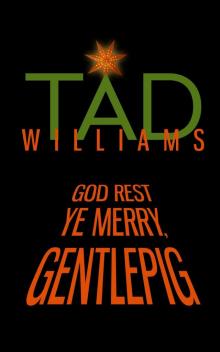 God Rest Ye Merry, Gentlepig
God Rest Ye Merry, Gentlepig Tailchaser's Song
Tailchaser's Song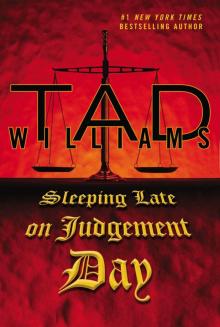 Sleeping Late on Judgement Day
Sleeping Late on Judgement Day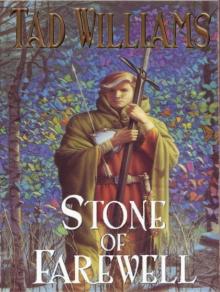 Stone of Farewell
Stone of Farewell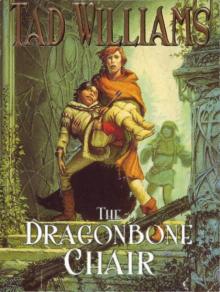 The Dragonbone Chair
The Dragonbone Chair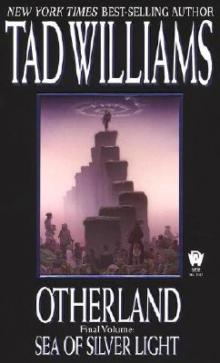 Sea of Silver Light
Sea of Silver Light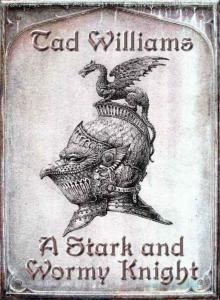 A Stark and Wormy Knight
A Stark and Wormy Knight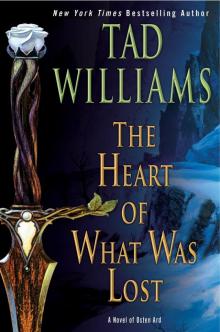 The Heart of What Was Lost
The Heart of What Was Lost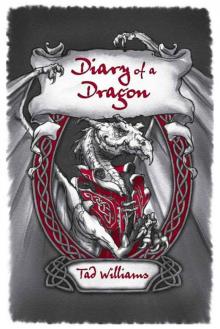 Diary of a Dragon
Diary of a Dragon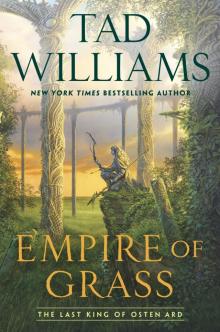 Last King of Osten Ard 02 - Empire of Grass
Last King of Osten Ard 02 - Empire of Grass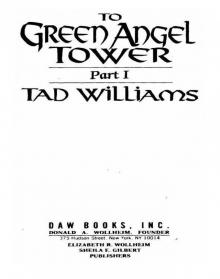 To Green Angel Tower, Volume 1
To Green Angel Tower, Volume 1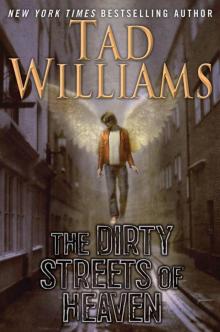 The Dirty Streets of Heaven
The Dirty Streets of Heaven River of Blue Fire
River of Blue Fire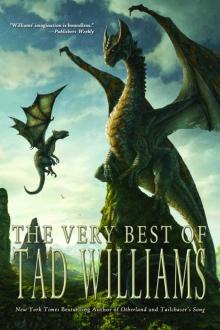 The Very Best of Tad Williams
The Very Best of Tad Williams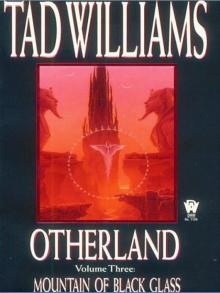 Mountain of Black Glass
Mountain of Black Glass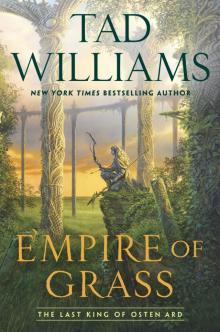 Empire of Grass
Empire of Grass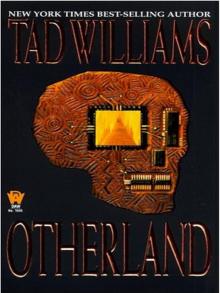 City of Golden Shadow
City of Golden Shadow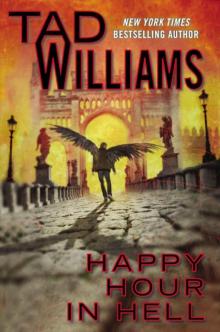 Happy Hour in Hell
Happy Hour in Hell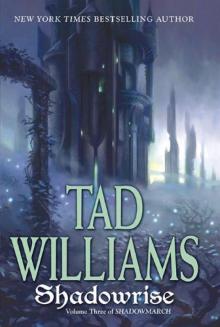 Shadowrise
Shadowrise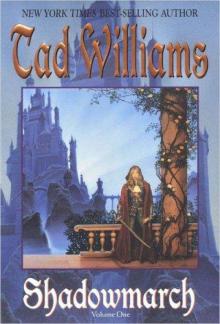 Shadowmarch
Shadowmarch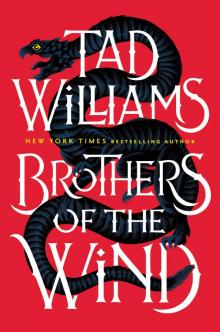 Brothers of the Wind
Brothers of the Wind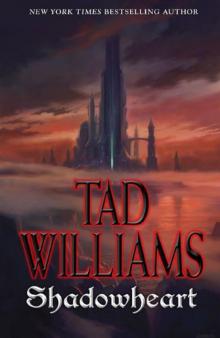 Shadowheart
Shadowheart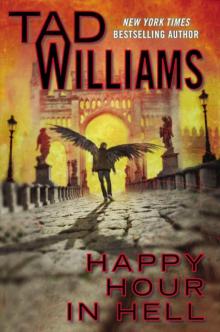 Bobby Dollar 02 - Happy Hour In Hell
Bobby Dollar 02 - Happy Hour In Hell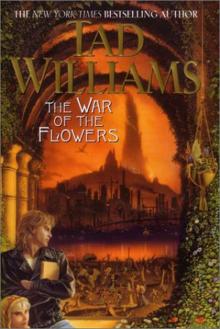 The War of the Flowers
The War of the Flowers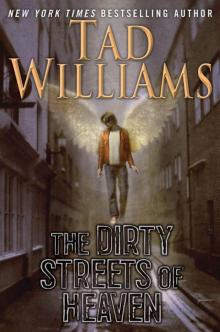 The Dirty Streets of Heaven bd-1
The Dirty Streets of Heaven bd-1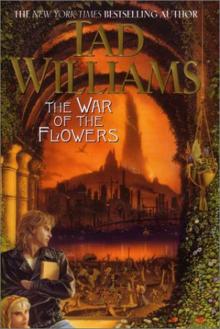 Tad Williams - The War of the Flowers (retail) (pdf)
Tad Williams - The War of the Flowers (retail) (pdf) Shadowheart s-4
Shadowheart s-4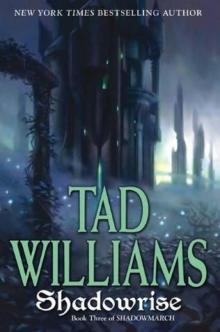 Shadowrise s-3
Shadowrise s-3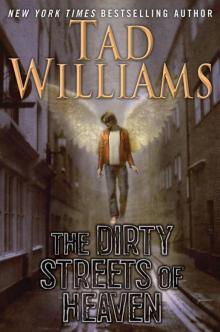 The Dirty Streets of Heaven: Volume One of Bobby Dollar
The Dirty Streets of Heaven: Volume One of Bobby Dollar The Stone of Farewell
The Stone of Farewell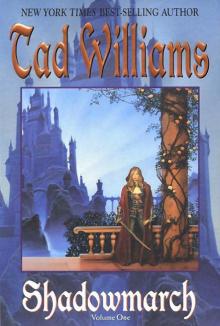 (Shadowmarch #1) Shadowmarch
(Shadowmarch #1) Shadowmarch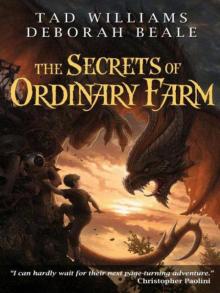 The Secrets of Ordinary Farm of-2
The Secrets of Ordinary Farm of-2 Shadowmarch s-1
Shadowmarch s-1![Bobby Dollar [04] God Rest Ye Merry, Gentlepig Read online](http://i1.bookreadfree.com/i1/04/06/bobby_dollar_04_god_rest_ye_merry_gentlepig_preview.jpg) Bobby Dollar [04] God Rest Ye Merry, Gentlepig
Bobby Dollar [04] God Rest Ye Merry, Gentlepig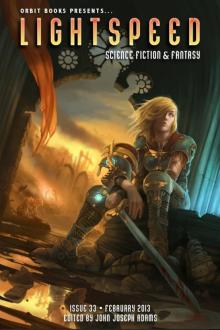 Lightspeed Issue 33
Lightspeed Issue 33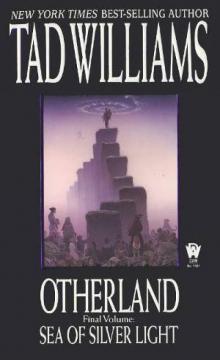 Sea of Silver Light o-4
Sea of Silver Light o-4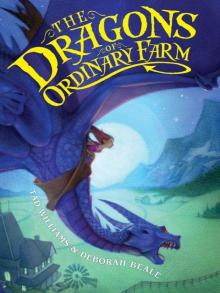 The Dragons of Ordinary Farm of-1
The Dragons of Ordinary Farm of-1 Shadowplay s-2
Shadowplay s-2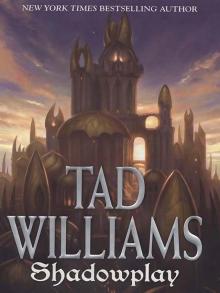 (Shadowmarch #2) Shadowplay
(Shadowmarch #2) Shadowplay